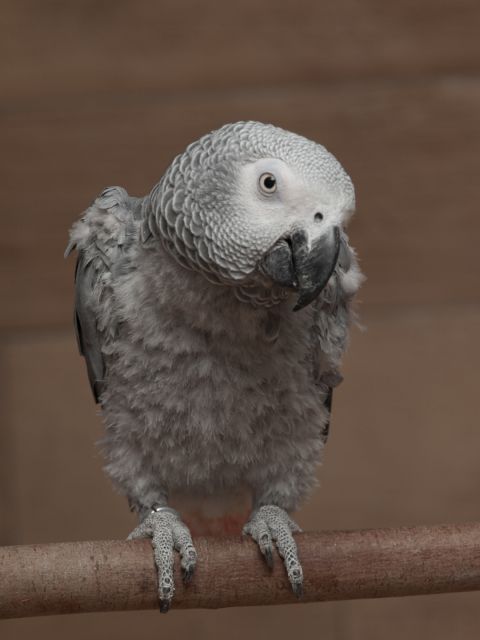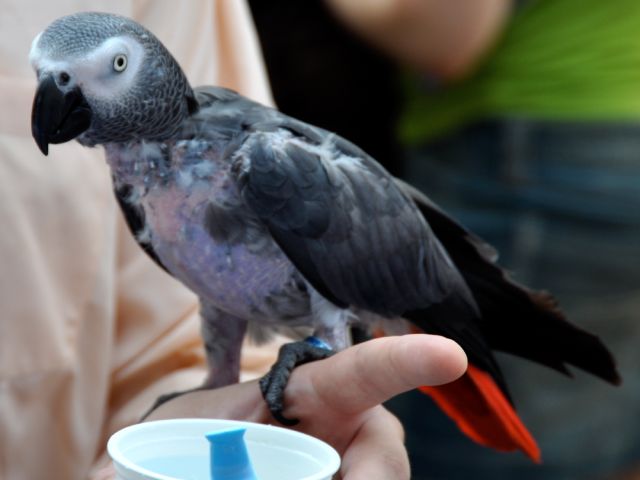There are several feather-destructive behaviors that present themselves in companion African Grey parrots. Among them are plucking – the actual removal of feathers, and chewing or barbering – the destruction of feathers that remain in the follicle. It often begins with over-preening – the act of cleaning and arranging feathers to an obsessive degree resulting in the damage or removal of good feathers, sometimes leaving bald patches.
Feather plucking has caused much heartache among owners of the beautiful Congo African Grey Parrot. Sometimes excessive feather plucking turns into self-mutilation leaving open wounds in the flesh just asking for infection. Many Congo African Grey parrots in captivity end up plucking causing their owners to feel a sense of failure and hopelessness.
Some Congo African Grey parrots pluck from a tiny area, such as on the insides of their legs and commonly from beneath the wings. Others will pluck their feathers from all over the body only limited only by places they are unable to reach with their beak, such as the head. Some clever greys use their feet to remove those feathers. If your bird is exhibiting this heartbreaking behavior, we’ll help you restore the beautiful grey feathers you fell in love with.
There is a number of possibilities for the causes of plucking, and there are 3 steps you must follow to determine what they are alleviated the precursors and stop the behavior.

Eliminate Medical Possibilities
This must always be your first course of action. Avian medicine is discovering more and more that illness and poor diet are possible causes of plucking. Once you have completed step one and your bird has been given a clean bill of health, move on to step 2
Determine Environmental Causes
Your parrot’s environment includes everything around it, from the cage and the room it is in, to the behavior and attitudes of the occupants of the house, to the air quality in the house, and everything in between. That’s a lot of stuff to consider. Here are some examples of things to be aware of…
If you’re a smoker and don’t have an outdoor aviary or separate air space for your Congo African Grey parrot, your bird is at great risk of becoming (if it hasn’t already) a feather plucker. You may have no idea just how detrimental a smoking habit can be to your parrot.
During the winter months and in dry climates, parrots sometimes suffer from dry, itchy skin. You may need to consider a humidifier and more frequent bathing routines. Parrots should be bathing as often as we do. They usually prefer 5-7 times per week during the summer months and 3-5 times per week in the winter. If you keep your parrot clean, it will not feel the need to continually preen to remove dander and debris from its feathers and there will be less attention called to those areas.

The Congo African Grey is very phobic by nature and if not properly desensitized to new things every day, your bird can become afraid of anything new from noises to people to objects. That’s why it’s important to introduce one new thing per day to your bird and successfully have them accept the new object as non-threatening. This can be anything from a new water dish to a new toy. Our training courses will help you teach your bird to overcome its fears and become the confident bird he deserves to be.
Is your bird getting enough clean water, healthy food, bathing opportunities, and sleep? The basic foundations of Congo African Grey Parrot care are essential for a healthy bird. If your parrot is lacking in any of these areas, feather plucking, as well as disease, can occur.
Is his cage too small? Does he have enough to do during the day? Intelligent species like Congo African Greys feel boredom and confinement intensely and this can result in anxiety. Feather plucking can become a favored activity to fill in the hours during an especially dull day and relieve those anxious feelings.
Have you added a new pet or family member? Occasionally, jealousy of another bird, new family member, or new pet can cause tremendous unrest in your Congo African Grey Parrot.
Is your bird courting with a bit too much enthusiasm? The breeding behaviors of Congo African Grey Parrots include head bobbing, clucking sounds, puffing out their chest, shredding and chewing everything in sight, and yes, feather plucking. If your bird is under the influence of hormones, look to Step 3.
Is he simply trying to get your attention? Quite possibly your Congo African Grey is plucking his feathers simply to get your attention. Maybe he only does it when you’re in the room. Do you run over to him to get him to stop? If so, you may be encouraging the behavior.
Consult parrot behavior experts
Feather plucking, if it is allowed to continue, can become a habit that leads to extremely unhappy and potentially aggressive birds.
It can also lead to illness. It is important to address feather plucking as soon as the behavior is recognized.
Because there are so many reasons that your Congo African Grey Parrot may be plucking, consulting an expert will help you isolate and solve the problem quickly. One of the main reasons parrots pluck is because they get nervous around their owners. Many owners of Congo African Grey Parrots have stopped their bird plucking, simply by training tricks as a way to overcome this nervousness.
